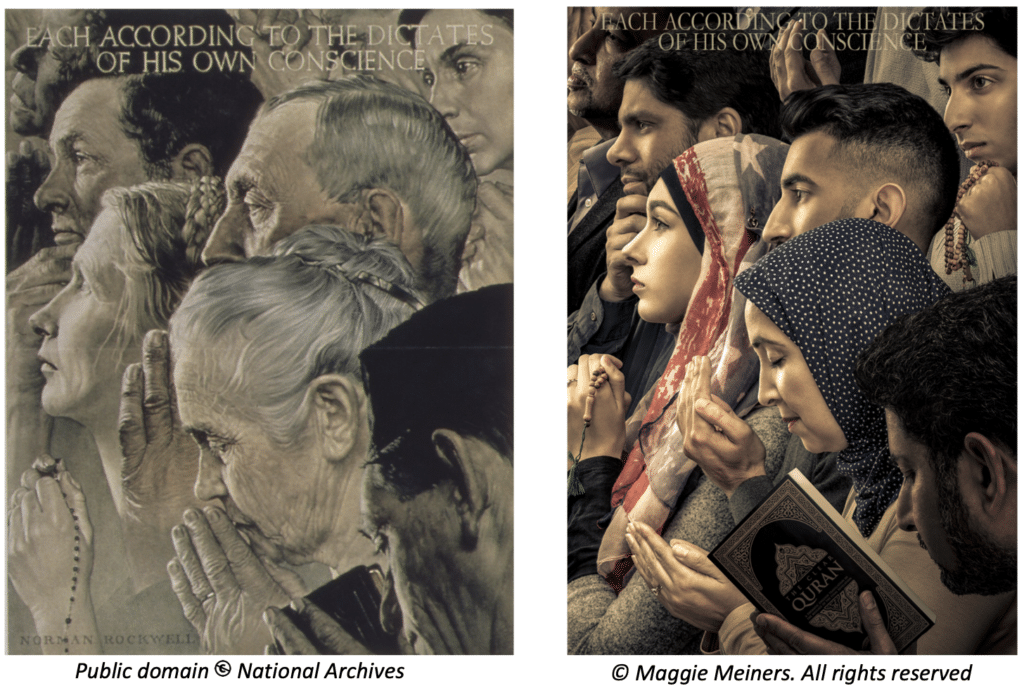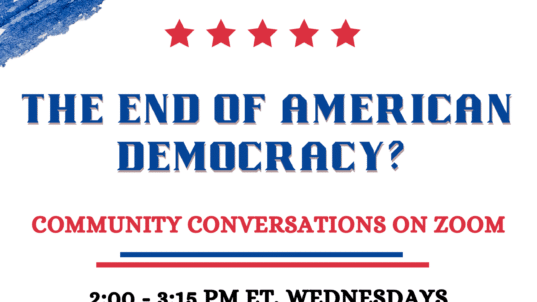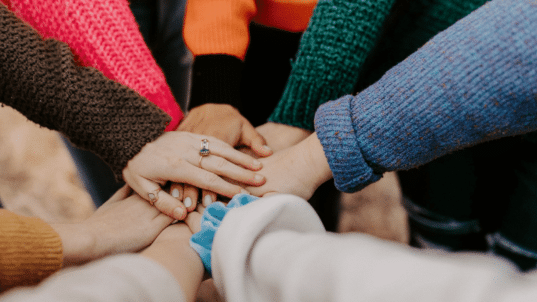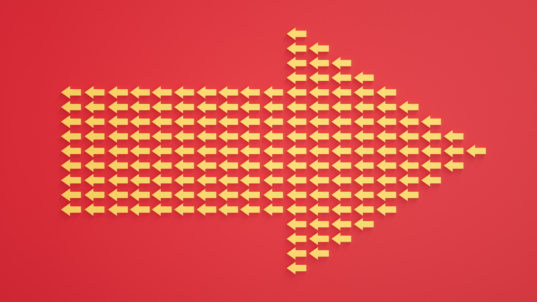
What does the freedom of religion mean? And how does it relate to the spirit of democracy?
In this four-part exploratory conversation series, Four Freedoms: The Spirit of Democracy Today and Tomorrow, we are helping each other to explore different aspects of freedom. To do this, we’re looking at the four freedoms articulated by FDR as core human rights: freedom of speech, freedom of worship, freedom from want, and freedom from fear. In our conversation on May 11, we explored the freedom of religion (we didn’t make a strict distinction of freedom of worship or freedom of religion). Scroll down below to read some of the different ways the participants were thinking about freedom of religion and different concerns about how it relates to the spirit of democracy.
What would you add about the meaning of freedom? Please join us by registering for our upcoming exploration of the freedom from want on May 25 at 1pm ET (more series info at the link). What do you think the freedom from want could mean? What if our democracy embraced the freedom from want as a core value? How might it relate to other values in a healthy democratic society? Join our next community conversation to explore these questions and enrich our sense of what freedom can mean.
What could the freedom of worship, or freedom of religion, mean?
- Freedom of religion can mean openness to different worldviews, different forms of wisdom about life and about the world, from which we all can learn
- Freedom of religion can mean searching for truth, allowing people to look inward to determine what they believe about the universe and their place in it
- Searching for meaning is an essential aspect of human existence–and that’s what religion is about
- Freedom of religion ultimately has to do with living a good human life, a life of meaning and purpose
- Freedom of worship is within you, it’s a matter of your actions and how you interact with others, which is separable from your beliefs
- You can worship and you can be religious without having to be affiliated with a formal religious organization
- Freedom of religion also can mean the freedom not to be conventionally religious, not to affiliate with any religious organization, and to be free from others’ religions
- Religious freedom is something that dominant social groups have, and they use this as a way to impose conformity upon others
- For them, religious freedom means their freedom to impose their views on others
- Freedom of religion is lacking when others impose their beliefs on you
- If you’re part of a religious minority or if you are religiously unaffiliated, you often have less freedom
- Most people aren’t so free in terms of how they acquire their beliefs–most adopt their family’s and their culture’s beliefs
- There’s a greater sense of freedom in countries where there are harmonious and cooperative relationships across different religious faiths
- It feels less free to live in a society with hostile inter-religious relations (you can’t live freely if there’s a threat of violence for crossing religious boundaries)
What are the challenges or questions facing freedom of religion and democracy?
- Religion is a major way we humans focus on what’s truly important: it conveys our fundamental vision of being a good person, living a good life in a good society
- Religion is often a major source of positive social behavior, of acts of caring, of positive social services
- Religion is a major way that people seek to control others and to enforce conformity to one particular way of being religious
- Religion has been a major source of conflict throughout history–people often use religion as a basis to express their fears and hatred of other groups
- Religion is increasingly being used as a way to exert or win political power (religion as a way to rile up the base)
- Enforcing conformity to one religion seems antithetical to democracy
- Enforcing an anti-religious society also seems antithetical to democracy
- Where do we draw the line between freedom to express religious beliefs and imposing those beliefs on others?
- Within a democratic society that recognizes the freedom of religion, how can we maximize the positive aspects of religious faith (pro-social behavior that focuses on what’s truly meaningful) and minimize the negative (conflict-seeking behavior that seeks to dominate other groups)?
- In a democratic society with religious diversity, how should we balance competing public policy choices that are based in different religious values?
- What role should religion play in shaping or determining public policy in our democracy?
- We seem to be in a less “ecumenical” moment today compared to the past, less open to seeking the truth in all different religions, so how can we re-establish that sort of openness or tolerance?
- How can we best combat religious intolerance or discrimination against other (especially minority) religious groups?
- How can we best cultivate a sense of humility and tolerance for religious diversity–or for the absence of religion?
- How might we make sure our society is better educated about different religions and about what it’s like to live within them (so people see, for example, what it’s like to be part of a religious minority)?
- How might we accommodate our democracy to the growing number of “nones”–those who are not affiliated with any organized religion?
- There’s often a disconnect between what members of a religion profess and how they actually live–so which is truly their “faith”?
- People may profess a faith that advocates helping the poor and welcoming the stranger–yet they may vote for harsh policies on the poor and on immigrants
- What role will demographic changes play in shaping freedom of religion in our democracy?
- Consider the impact of younger generations who are more tolerant than their elders
- Consider the role of immigrants introducing new religious traditions
- Consider the potential of backlashes against these demographic changes, with movements against religious diversity (such as a rise of antisemitic and anti-muslim behavior)
- Consider the impacts of intermarriage
- What would it mean to live in a democracy with a state-sanctioned religion?
- There may be a greater sense of social cohesion, but only if you are in the mainstream or dominant group
- There is no comparison to the level of freedom you feel living with religious freedom in a religiously diverse country
- How might we differentiate between religion and culture, since so many of our cultural norms or values have religious roots?



